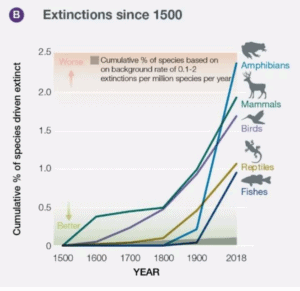The biggest threat to forest-dwelling wildlife is the loss and damage to their habitat, mostly caused […]
Tuesday, August 13th, 2019
Stephan: By a nearly universal consensus of American historians, Donald Trump is the worst president in American history. In my view, he is also a thoroughly despicable human being. If it were up to me he would be impeached, convicted, subsequently tried in court, and sent to prison.
Yet, according to the Gallup Organization, as of July, he is supported and approved of by 88% of Republicans, 38% of Independents and 7% of Democrats. That tells you something serious and noteworthy about what is wrong with America.
Perhaps that sad truth is why he and his toadies decided they could get away with gutting the overwhelmingly bipartisan Endangered Species Act that has guided American environmental policy since it was passed in 1973, and despite the continuous reports from every scientific group that has studied the issue warning that mass extinctions are threatening the very survival of the American ecosystem. Here are some facts.

Credit: IPBES
In May, a United Nations panel on biodiversity released a massive, troubling report on the state of the world’s animals. The bottom line: As many as 1 million species are now at risk of extinction if we don’t act to save them.
Species of all kinds — mammals, birds, amphibians, insects, plants, marine life, terrestrial life — are disappearing at a rate “tens to hundreds of times higher than the average over the last 10 million years” due to human activity, the report stated. It implored the countries of the world to step up their actions to protect the wildlife that remains. Wildlife like the endangered gray wolves and caribou that roam the United States, or the threatened polar bear in the Arctic.
The Trump administration has just done the opposite.
On Monday, the US Fish and Wildlife Service and the National Oceanic and Atmospheric Administration announced they were pushing through changes to the Endangered Species Act that will, in effect, weaken protections for species, and possibly give industry more leeway to develop […]
1 Comment














